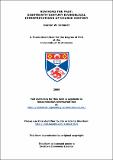Files in this item
Reviving the past : eighteenth-century evangelical interpretations of church history
Item metadata
| dc.contributor.advisor | Holmes, Stephen R. | |
| dc.contributor.author | Schmidt, Darren W. | |
| dc.coverage.spatial | 272 | en |
| dc.date.accessioned | 2009-12-10T15:02:51Z | |
| dc.date.available | 2009-12-10T15:02:51Z | |
| dc.date.issued | 2009-06-25 | |
| dc.identifier | uk.bl.ethos.552220 | |
| dc.identifier.uri | https://hdl.handle.net/10023/829 | |
| dc.description.abstract | This study addresses eighteenth-century English-speaking evangelicals' understandings of church history, through the lens of published attempts to represent preceding Christian centuries panoramically or comprehensively. Sources entail several short reflections on history emerging in the early years of the transatlantic Revival (1730s-1740s) and subsequent, more substantial efforts by evangelical leaders John Gillies, Jonathan Edwards, John Wesley, Joseph and Isaac Milner, and Thomas Haweis. Little scholarly analysis exists on these sources, aside from the renaissance of interest in recent decades in Edwards. This is surprising, considering the acknowledged prominence of history-writing in the eighteenth century and the influence attributed, then and now, to the works of authors such as Gibbon, Hume, and Robertson. The aim is, first, to elucidate each of the above evangelicals' interpretations of the Christian past, both in overview and according to what they said on a roster of particular historical events, people and movements, and then to consider shared and divergent aspects. These aspects range from points of detail to paradigmatic theological convictions. Secondarily, evangelical church histories are analyzed in relation to earlier Protestant as well as eighteenth-century 'enlightened' historiography, in part through attention to evangelical authors' explicit engagement with these currents. This contextualization assists in determining the unique qualities of evangelical interpretations. Is there, then, evidence of a characteristically 'evangelical' perspective on church history? An examination of this neglected area illumines patterns and particulars of evangelicals' historical thought, and these in turn communicate the self-perceptions and the defining features of evangelicalism itself. Findings support the primary contention that evangelical leaders made use of a dynamic pattern of revival and declension as a means of accounting for the full history of Christianity. Beyond displaying the central place of 'revival' for evangelicals, these church histories demonstrate evangelicalism‘s complex relationship—involving both receptivity and critique—with Protestant and Enlightenment currents of historical inquiry. | en |
| dc.language.iso | en | en |
| dc.publisher | University of St Andrews | |
| dc.rights | Creative Commons Attribution-NonCommercial-NoDerivs 3.0 Unported | |
| dc.rights.uri | http://creativecommons.org/licenses/by-nc-nd/3.0/ | |
| dc.subject | Evangelicalism (18th-century) | en |
| dc.subject | Evangelical historiography | en |
| dc.subject | Church historiography | en |
| dc.subject | Protestant historiography | en |
| dc.subject | Enlightenment historiography | en |
| dc.subject | Revival | en |
| dc.subject | William Cooper | en |
| dc.subject | Thomas Prince Sr. | en |
| dc.subject | Jonathan Edwards | en |
| dc.subject | History of the work of Redemption | en |
| dc.subject | John Gillies | en |
| dc.subject | Historical collections | en |
| dc.subject | John Wesley | en |
| dc.subject | Concise ecclesiastical history | en |
| dc.subject | Joseph Milner | en |
| dc.subject | History of the Church of Christ | en |
| dc.subject | Isaac Milner | en |
| dc.subject | Thomas Haweis | en |
| dc.subject | Impartial and succinct history | en |
| dc.subject.lcc | BR138.S65 | |
| dc.subject.lcsh | Church history--Historiography--18th century | en |
| dc.subject.lcsh | Evangelicalism--England--History--18th century | en |
| dc.subject.lcsh | Evangelicalism--United States--History--18th century | en |
| dc.title | Reviving the past : eighteenth-century evangelical interpretations of church history | en |
| dc.type | Thesis | en |
| dc.type.qualificationlevel | Doctoral | en |
| dc.type.qualificationname | PhD Doctor of Philosophy | en |
| dc.publisher.institution | The University of St Andrews | en |
This item appears in the following Collection(s)
Except where otherwise noted within the work, this item's licence for re-use is described as Creative Commons Attribution-NonCommercial-NoDerivs 3.0 Unported
Items in the St Andrews Research Repository are protected by copyright, with all rights reserved, unless otherwise indicated.


